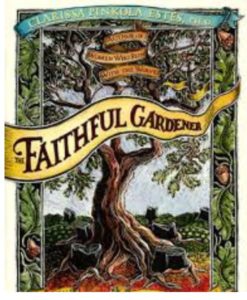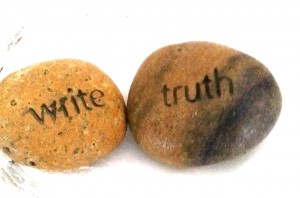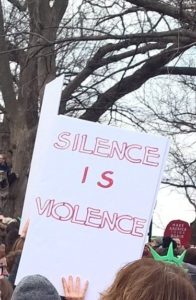We were so moved and energized by Oprah’s speech. Now what? What do we do with all that motion and momentum now that the red carpets and cameras have been rolled up and put away?
I started a survivor blog fewer than four years ago because I couldn’t find ANY other person writing, thinking and talking about life after a childhood full of trauma. I wasn’t looking for stories about child abuse or trauma but about how adults manage life, love, and parenting after surviving. I didn’t meet, see or hear from anyone in ordinary and daily circles at work, school or in the neighborhood.
I was looking for conversations that didn’t come with a co-pay or a diagnosis. I wasn’t looking for a fast fix (o.k., maybe a little0 but even more I wanted the company and camaraderie of others living the same questions at the same time in real time and our real lives. That’s what I ached for. It wasn’t available anywhere that I could find.
If and when I dared to speak it was usually in whispers to lovers, friends or my journals as well as therapists. A few short years later there’s open, public, and televised conversation about surviving and sexual violence. That’s a boatload of change. I am living, seeing and feeling it and I am reminded daily that I’m not alone. We all know what #MeToo means now. It’s astounding.
As a culture, we’ve got more to sort through and figure out though.
It’s not all over or all better.
We’re not all good or all done.
Survivors know the vulnerability and the backlash that comes after disclosure, how the truth hangs out in the world waiting to be held, healed, acknowledged or responded to. And how often, it isn’t. That wait can be a long, lonely, and painfully revealing. We celebrate all the women on Facebook who shared Oprah’s speech, women who maybe never say things like rape culture, survivor or trauma-informed and also we notice how few men are sharing the same national broadcast. I don’t know any men in my world talking about the #MeToo movement this week.
Often, the world returns to normal too soon even when the old normal is exactly what so many of us are still recovering from.
How do we get back to day to day, changed, in a world ambivalent and inexperienced with hearing, holding and healing?
How do we rally together and move forward?
Many are sharing words and experiences in public and private forums for the first time or considering doing so. Many are thinking about if, when and how to share life experiences and the stories we’ve carried silently, alone and within forever.
Many are weighing the personal and professional consequences and repercussions that come with disclosure – as well as how we feel with ourselves in the middle of the night in the after.
How can we heal, get real, and deal with the aftermath all at the same time? That’s where so much of the work is and it’s the part we can’t do alone. What now? What next?
Thank f_ck we’re not alone in figuring this out.
Suffering isn’t new. Surviving isn’t either – although it’s not guaranteed and this is serious, scrappy business.
Before we had Oprah on TV or vulnerability Ted Talks with Brene Brown (so good…) we had Clarissa Pinkola Estés who is mixt of Maya Angelou, Brene Brown and Mary Oliver.
l love her so much.
While she’s most known for writing Women Who Run with the Wolves but speaks, performs and has written on many topics. She was a trained psychoanalyst with a clinical practice for 25 years but that’s not her biggest credential. She’s a storyteller, mother, wild woman, teacher, author, healer. She introduced many to the concept of the wounded healer and shares about her own childhood pain, loss and trauma as well as that of others in myth, fable, history and in the daily experiences of women and men all over the world. She lets her personal life inform her professional work and her professional work inform her stories. She’s mesmerizing, powerful to hear or read or learn from. She’s been raising up women and helping us find ourselves and each other for years.
I’ve been pouring over her words again which are food, fuel, and guidance.
for what’s next.
The sharing.
The caring.
The healing.
From the Faithful Gardener.

Stories Explain Survival & Recovery
“What does it mean to live with a war and memories of war inside oneself? It means one lives in two worlds. One looking for hope, the other feeling hopeless. One looking for meaning, the other convinced that the only meaning in life is that there is no meaning in life.
In each of our people who have suffered so greatly, there were two struggling persons. One living the life of the new world, the other running, constantly running, from memories of hell that rose up and gave chase. Ghosts animated by themselves, roused by a click of a door frame, a cat in heat screeching suddenly in the night, the innocent dog at the screen door scratching to come in, a sudden gust of wind causing a curtain to sweep a jar off a table in a shot to the floor.
Mundane matters caused terror, tears, or revulsion: the smell of a certain gun oil, the first snow and fresh blood of deer gutted for food, a certain kind of bone ache from field work, an old story about a bridal veil, a sound of cattle hooves on a metal culvert, a sudden train whistle and the sound of the long trestle rumbling.
There were wars in Uncle that make him remember, as he said, “too much.” There were wars between the death of hope, and the hope for death, the hope for life, and a life of hope. Sometimes the only cease-fire that held for any length of time had to be negotiated by a treaty forged with much schnapps and much vodka.” pgs. 23-24
The GIft of Story from The Gift of Story
“…the ultimate gift of story is twofold; that at least one soul remains who can tell the story and that by the recounting of the tale, the greater forces of love, mercy, generosity, and strength are continuously called into being in the world.”
Because We’re All Keepers of Stories
“The life of a keeper of stories is a combination of researcher, healer, linguist in symbolic language, teller of stories, inspiratrice, God talker and time traveler.”
We Trigger Health When We Talk about Trauma
“It must be noted also that many of the most powerful medicines, that is stories, come about as a result of one person’s or group’s terrible and compelling suffering. For the truth is that much of the story comes from travail; theris, ours, mine, yours, someone’s we know, someone’s we do not know far away in time and place. And yet, paradoxically, these very stories that rise from deep suffering can provide the most potent remedies for past, present and even future ills.”

Pgs. 3-5
People are Silent Because We Don’t Believe Others Care or Understand & Celebrating Sacred Normalcy
“Auntie, like all who survived, repeated over and over again. “I cannot bear to speak of these things. No one can understand how terrible it was. No one can understand what it was like unless they saw it, smelled it, heard it, clung to life through it themselves.” When I asked what little present she would like for her birthday or for a holiday, her reply was always the same. “No gift please, edes kis, my sweet little one. The gifts I long for are here now – to be able to hold a child again, to be able to feel love, to be able to laugh sometimes, and to finally be able, once more, to cry. All I have yearned for is here.”
Pg. 6-7
Caring is Balm Even though the Past (& Maybe Even the Present) Can’t Be Changed
“A nd with this, the old man, who was hardly more than a heap of bones, ended his story. There in the hut, his words made the loneliness and fear each of them felt, less lonely, less fearsome. Not because reason to fear was lifted magically from them, for it was not, but because the story provided them with strength.”
nd with this, the old man, who was hardly more than a heap of bones, ended his story. There in the hut, his words made the loneliness and fear each of them felt, less lonely, less fearsome. Not because reason to fear was lifted magically from them, for it was not, but because the story provided them with strength.”
How Will I Know If/When it’s o.k. to Talk about Trauma, Race or ACEs?
“For some stories, considerations about the right time, right place, right person, right preparation and right purpose guides when and whether this story should be told or not. But for family stories, stories’ from one’s culture and stories from one’s personal life, anytime may be just the right time to give the gift of story.
Like night dreams, stories often use symbolic language, therefore bypassing the ego and persona, and traveling straight to the spirit and soul who listen for the ancient and universal instructions embedded there. Because of this process, stories can teach, correct errors, lighten the heart and the darkness, provide psychic shelter, assist transformation and heal wounds.
In our present time, there is a goodness to and necessity for, rugged independence among individuals. but this is often best served and supported in good measure by deliberate interdependence with a community of other souls. Some say that community is based on blood ties, sometimes dictated by choice, sometimes by necessity. And while this is quite true, the immeasurably stronger gravitational field that holds a group together are their stories – the common and simple ones they share with one another.
Won’t Stories Rip People Apart?
Though these may revolve around crises tamed, tragedy averted, death be not denied, help arriving at the last moment, foolish undertakings, hilarity unbounded and so on-the tales people tell one another weave a strong fabric that can warm the coldest emotional or spiritual nights. So the stories that rise up out of the group become, over time, both extremely personal and quite eternal, for they take on a life of their own when told over and over again.
Whether you are an old family, a new family or a family in the making, whether you be lover or friend, it is the experiences you share with others and the stories that you tell about those experiences afterward, and the tales you bring from the past and future that create the ultimate bond.
A Prayer
Refuse to fall down,
If you cannot refuse to fall down,
refuse to stay down,
If you cannot refuse to stay down,
life your heart toward heaven,
and like a hungry beggar,
ask that is be filled,
and it will be filled.
You may be pushed down,
You may be kept from rising,
But no one can keep you
from lifting your heart
toward heaven-
only you.
It is in the middle of misery
that so much becomes clear.
The ones who say nothing good
came of this,
is not yet listening.
C.P. Estes
Clarissa Pinkola Estés doesn’t just know about the power of art, story and nature but weaves them into her works. She talks about soul, spirit, trauma, and survival in ways that engage and heal and can reach lots of people. She gets suffering and silence, survival and healing from her personal and professional experiences and she understands survival as well.
She offers guidance on how humans have and do reconnect with instinct, love, and wisdom and each other during and after pain, loss and trauma She writes about the power of story, storytelling, story sharing and it’s instructive for all who get nervous about talking about or listening to anything related to trauma, traumatic stress, war, sexual violence, childhood adversity (ACEs) as well as all things healing.
So many have questions about if, when and how to ask, talk, or listen whether online, in person or in the doctor’s office. Sometimes I forget not all have known the sacred beauty and healing that can happen in story or writing circles where people just feel safe to share the truth without fixing, doing or writing prescriptions. We’re all still learning how t0 break silence – all still practicing when alone as well as in community settings. We didn’t always know how to talk about death, cancer, AIDs or racism. We’re still struggling because hard topics make for hard conversations. That’s o.k. That’s more than o.k. Avoidance and silence isn’t safest and best. It’s just easiest.
 We can understand where the phrase “silence is violence” and we do that by honoring stories and one another even when, especially when it’s hard. That’s where the healing happens for all of us – between us.
We can understand where the phrase “silence is violence” and we do that by honoring stories and one another even when, especially when it’s hard. That’s where the healing happens for all of us – between us.
To find more of the amazing work of Clarissa Pinkola Estés, please visit her website.
You Matter Mantras
- Trauma sucks. You don't.
- Write to express not to impress.
- It's not trauma informed if it's not informed by trauma survivors.
- Breathing isn't optional.
You Are Invited Too & To:
- Heal Write Now on Facebook
- Parenting with ACEs at the ACEsConectionNetwork
- The #FacesOfPTSD campaign.
- When I'm not post-traumatically pissed or stressed I try to Twitter, Instagram & Pinterest.
thank you so much for this post!
Great article!